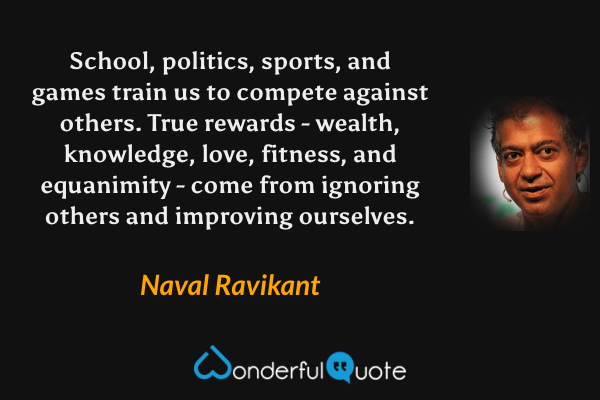At first I had titled this “pursue excellence, not success” and I realized that this was my own conditioning and programming that was resisting a blog post about the dangers of pursuing success. When we say the pursuit of excellence, I think that they can imply an end goal a means or an aim to get somewhere and this is the problem. When we don’t know who we are, we continue to pursue external things and rewards. We start to desire, success and more success, and it’s ingrained in our culture that we should strive to be successful. After all, we have to do something we have to do some action there’s no way around it so we played games to earn more, to get the attention and applause from others, to be the one who “made” it.
This sort of drive, this ambition to succeed, misses the point. We all want things – our desires are endless. But know, chasing success brings little pleasure. In fact, you should know you’ll be quite miserable.
Desire is a contract you make with yourself to be unhappy until you get what you want – Naval Ravikant
Mark Manson seconds this, claiming:
“The most important question to ask is what pain do you want in your life? What are you willing to struggle for?”
To me this does NOT sound fun. Should I be teaching my daughters “no pain no gain”? In a world of exalting grit and willpower it sounds exhausting.
However, in my studies, I feel like I’m onto another way. I can’t say I’m crystal clear yet. The hint of a path that is not so painful comes from this quote from Larry Ellison on Steve Jobs.
He [Steve Jobs] would constantly review things and continuously make them better until he was marginally satisfied and then
they could release the product. If you have that kind of obsession combined with picasso’s aesthetic and edison’s inventiveness then you were the next Steve Jobs. Apple became the most valuable company on earth and it wasn’t even one of Steve’s goals. He never you know…he wasn’t trying to be rich. He wasn’t trying to be famous. He wasn’t trying to be powerful. He was obsessed with the creative process and building something that was beautiful.– Larry Ellison on Steve Jobs
Sounds neat? But don’t be fooled. I think this is half-way to a deep truth. The word obsession implies some sort of mental dysfunction, so I’d substitute out the word obsession with passionate.
The difficulty of finding your passion: what if you don’t what you are passionate about?
Jim Rohn, who I really admire has a video clip where he was asked how do people discover what their passionate about and he essentially shrugs his shoulder he says well if you ask people what their passion about they would really struggle with coming up with an answer. He continues with his response, which has never settled well with me. He says that most people just want to improve their livelihood and accomplish goals.
I think trying to find your passion is a little bit maybe too strong a word greatly desiring to be extremely successful I think probably is sufficient…
I think if you have an extreme desire to wish to be successful so you can accomplish all you wish to accomplish, be as generous as you’d like to be be, as strong as you’d like to be in terms of financial strength involved in entrepreneurial projects that you can’t do without let’s say sizeable money. So you go for that, to me I think that’s sufficient. I think if you say you have to find your passion, people find that a little bit confusing where would I find it and what could I be passionate about I guess you could start with saying I’m passionate about providing unusual success for myself and for my family so that my children will say inthe years to come we had the most incredible life together as a family…– Jim Rohn
Jim Rohn is someone who is from the self improvement movement where it’s all about goal setting and achieving and ambition, (in fact he wrote a book called the Power of Ambition).
Will setting goals and becoming more disciplined provide the zest and joy in doing?
Naval Ravikant says astutely,
“Discipline is just you fighting with yourself to do something you don’t wanna do”
And isn’t that so true? There’s a book by Cal Newport called “So Good They Can’t Ignore You.” Again, that book troubled me because he follows a school of thinking that the great Jim Rohn also expounds. Cal Newport says that to succeed, you need to be so good that they can’t ignore you.
I’ve read it and I feel he argues to continue working on your craft well without an expectation of reward and that later the rewards come through mastery. This I feel is correct, but I’ve seen Cal Newport and he just seems like a person that’s very dissociated. He’s not very emotive or expressive – and maybe thats his personality or maybe thats because he’s forcing himself to do a lot of things he doesn’t want to do. Again, that’s my judgement and perhaps harsh – as I haven’t read all his books or know all his ideas. But I do feel from his book that he is arguing against aligning your brain and heart.
All this isn’t to say that we only should only do things that we love, but I think it calls to our attention that we don’t know what we love. And that’s OK.
We don’t love what we do
Krishnamurti puts it eloquently that we don’t love what we do. We’re just always calculating and chasing how to get a reward. And that, is not natural, it’s not authentic. There’s a great zen pencil’s comic that illustrates this nicely in a story.
We’ve lost touch with what life was when we were not trying to hold on to our careers or when we were not posting on social media for likes and applause. We are always competing or being envious.
But how to stop chasing rewards and become more authentic- discovering what we really love? How do we pursue our natural interests and really engage in that – without tricking ourselves?
To me, what I am finding is that if we are working on things that are meaningful to us (the hell with society and others) — then it’ll help us to not to “sell out”.
If you are occupied with your work, then you do not love your work. Do you understand the difference? If I love what I am doing, I am not occupied with it, my work is not apart from me. But we are trained in this country, and unfortunately it is becoming the habit throughout the world to acquire skill in work which we don’t love. There may be a few scientists, a few technical experts, a few engineers who really love what they do in the total sense of the word. But most of us do not love what we are doing and that is why we are occupied with our livelihood. I think there is difference between the two if you really go into it. How can I love what I am doing if I am all the time driven by ambition, trying through my work to achieve an aim, to become somebody, to have success? An artist who is concerned with his name, with his greatness, with comparison, with fulfilling his ambition, has ceased to be an artist; he is merely a technician like everybody else. Which means, really, that to love something there must be a total cessation of all ambition, of all desire for the recognition of society, which is rotten anyhow. [Laughter] Sirs, please don’t. And we are not trained for that; we have to fit into some groove which society or the family has given us. Because my forefathers have been doctors. Lawyers, or engineers, I must be a doctor, lawyer, or an engineer. And now there must be more and more engineers because that is what society demands. So we have lost this love of the thing itself, if we ever had it, which I doubt. And when you love a thing, there is no occupation with it. The mind isn’t conniving to achieve something, trying to be better than somebody else; all competition, all desire for success, for fulfilment, totally ceases. It is only the ambitious mind that is occupied.
J. KrishnamurtiAs One Is. pp” 68-69
Just follow your fun?
So Krishnamurti highlights how we are conditioned, groomed to adhere to what society or our parents deem as acceptable or what is demanded (e.g. the engineers he mentions). So what to do, just follow your fun? This is the hedonistic approach and it’s better than the conditioning (at least you are associated with your feelings), it will not bring you satisfaction just short-term pleasure.
The old marshmallow test demonstrated that kids that could put off eating a marshmallow – later in life were “more successful” (not sure if they were more happy – but that’s a conversation for another day). That test was basically a model for how life works as an adult. We simply can’t all have what we want all the time. In fact, a lot of what we want has to be earned. Meaning, we have to put off our own self interests and get up in the morning, brush our teeth, put our pants on, and get to work — even if we don’t FEEL like it. By doing that, we are rewarded later for what value we can bring to society (whether we enjoy bringing that value or not). Those who can push and keep working – even if they are not in love with what they are doing, get rewarded. So this conditions us – I only do things if I get rewarded.
—–
More later…

